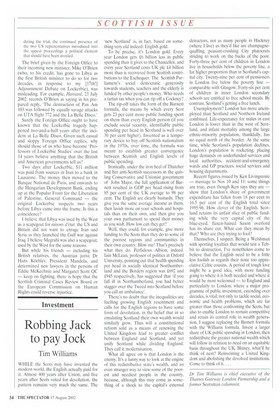Investment
Robbing Jack to pay Jock
Tim Williams
WHILE the Scots may have invented the modern world, the English actually paid for it. Almost 400 years after Union, and five years after Scots voted for devolution, the pattern remains very much the same. The 'new Scotland' is, in fact, based on something very old indeed: English gold.
To be precise, it's London gold. Every year London gets £6 billion less in public spending than it gives to the Chancellor, and every year Scotland costs UK plc £4 billion more than is recovered from Scottish contributions to the Exchequer. The Scottish Parliament's social democratic generosity towards students, teachers and the elderly is funded by other people's money. Who needs a tartan tax when you can rip off a Cockney?
The rip-off takes the form of the Barnett formula, the means by which every Scot gets 23 per cent more public funding spent on them than every English person (if you exclude social security, identifiable public spending per head in Scotland is well over 30 per cent higher). Invented as a temporary device to buy off Scottish nationalism in the 1970s, over time, the formula was meant to establish greater convergence between Scottish and English levels of public spending.
Ironically, under the iron heel of Thatcher and her anti-Scottish successors in the quisling Conservative and Unionist government of John Major, the full application of Barnett resulted in GDP per head rising from 85 per cent of the UK average to 98 per cent. The English are clearly bastards. They give you the same average income as them, then lavish more on your schools and hospitals than on their own, and then give you your own parliament to spend their money as you wish. How low can they get?
Well, they could, for example, give more funding to the Scots than they do to some of the poorest regions and communities in their own country. Blow me! That's precisely what they do. Perfidious Albion. indeed. lain McLean, professor of politics at Oxford University, pointing out that health spending per head in socially identical Northumberland and the Borders region was £692 and £945 respectively, has suggested that 'if you fall ill in Northumberland. you had better stagger over the Tweed into Scotland before you call an ambulance'.
There's no doubt that the inequalities are fuelling growing English resentment and calls for the English regions to have some form of devolution, in the belief that in so emulating Scotland their own wealth would similarly grow. Thus will a constitutional reform sold as a means of renewing the United Kingdom lead to greater conflict between England and Scotland, and yet unify Scotland while dividing England. They call it modernisation.
What all agree on is that London is the enemy. It's a funny way to look at the engine of this redistributive state's wealth, and an even stranger way to view some of the poorest and neediest people in the country, because, although this may come as something of a shock to the capital's external detractors, not as many people in Hackney (where I live) as they'd like are champagnequaffing, peasant-crushing City plutocrats striding to work on the backs of the poor. Forty-three per cent of children in London live in households below the poverty line, a far higher proportion than in Scotland's capital city. Twenty-nine per cent of pensioners in London live below the poverty line — comparable with Glasgow. Forty-six per cent of children in inner London secondary schools are entitled to free school meals. By contrast, Scotland's getting a free lunch.
Unemployment? London has more unemployed than Scotland and Northern Ireland combined. Life-expectancy for males in east London is lower than in the west of Scotland, and infant mortality among the large ethnic-minority population, thankfully, has no equal north of the border. At the same time, while Scotland's population declines, London's population is rocketing, placing huge demands on underfunded services and local authorities, accident-and-emergency wards and GP practices, social services and housing departments.
Recent figures issued by Ken Livingstone — message to Nos 10 and 11: some things are true, even though Ken says they are — show that London's share of government expenditure has fallen from 18 per cent to 16.5 per cent of the English total since 1995/96. How clever of the English. Scotland retains its unfair slice of public funding while the very capital city of the blue-eyed, flaxen-haired Saxon overlord has its share cut. What can they mean by that? Who are they trying to fool?
Themselves, I suspect. Being a Welshman with sporting loyalties that would test a Tebbit to destruction, I've nonetheless come to believe that the English need to be a little less foolish as regards their none too appreciative Celtic cousins. A period of tough love might be a good idea, with more funding going to where it is both needed and where it would be most welcomed — to England and particularly to London, where a major programme of public investment, extending over decades, is vital; not only to tackle social, economic and health problems, which are far greater than those confronting the Scots, but also to enable London to remain competitive and retain its central role in wealth generation. I suggest replacing the Barnett formula with the Williams formula. Invest a larger share of UK public spending in London, then redistribute the greater national wealth which will follow in relation to need on an equitable basis throughout the UK. Blimey, what'll he think of next? Reinventing a United Kingdom and abolishing the devolved institutions. Come to think of it... .
Dr Tim Williams is chief executive of the Thames Gateway London Partnership and a former Scotsman columnist.






























































 Previous page
Previous page